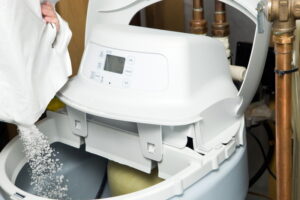You’ve probably heard of hard water, and know that people sometimes complain that it causes problems in their homes. But how much do you actually know about it? Could it be causing problems for you? We’ll give you the details on what hard water is, how to spot the warning signs that your water is too hard, and what to do about it.
Calcium, Magnesium, and Iron, Oh, My!
When water is swirling around in underground aquifers, bubbling up in springs, or rushing in rivers, it is rubbing against all kinds of things, especially minerals. And since water is so good at dissolving things—which is why we use it for cleaning—some molecules of those minerals get dissolved into the water and carried along with it. When we talk about hard water, the most common minerals are calcium, magnesium, and iron.
What Dissolves Must Be Deposited
Those minerals won’t stay dissolved in the water forever. Small amounts of the minerals will be gradually deposited from the water onto whatever surface the water runs past. Picture it like water dripping in a cave: each drop of water only leaves a tiny speck of mineral matter behind, but over time, this gradual mineral deposit becomes a huge stalactite!
Problems Hard Water Can Cause
As you can see from the stalactite example, one problem hard water causes is mineral buildup or scaling. This will occur on fixtures, leaving chalky or discolored streaks or clogging the holes in your showerhead with mineral deposits. It will also occur where you can’t see it, inside your pipes, water heater, and in other appliances that use water, like your dishwasher, washing machine, and coffee maker.
Another issue is that hard water already has so much dissolved into it that it doesn’t do a great job dissolving soap. This can lead to poorly washed laundry and dishes with dried soap residue left on them. It also makes soap scum develop more quickly, which leaves a mess in your shower and can clog drains.
Finally, hard water is not ideal for washing yourself, either. It can lead to limp and lifeless hair, because the shampoo isn’t being thoroughly rinsed out. It can also be drying for the skin, leaving you itchy and desperately trying to moisturize the dryness away.
When to Worry about Hard Water
If you’ve got any of the problems we mentioned above, it’s time to consider getting a water softener in Boerne, TX. You should also keep an eye out for lowered water pressure (from your pipes being partly clogged with mineral scaling), frequent drain clogs (for the same reason or from undissolved soap scum), or strange behavior from water-using appliances.
A water softening system uses a different mineral, often sodium. The water entering your home passes through a cylinder containing the sodium, and the other minerals are attracted to it. They become stuck while the rest of the water passes through, now carrying a much lighter mineral load.
If you do think hard water might be an issue in your home, or you have any other questions about water quality or your plumbing, we’ll always be happy to help.
Contact D’Spain Sales & Service to talk to a member of our team.






















